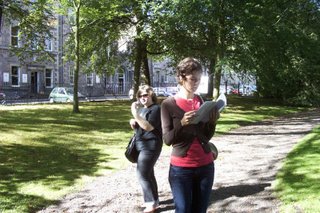
So far most of these posts have sounded a bit down. Life is not so grey, actually. Today we (myself and flatmates) wandered further north in the city than I have ever been. There was one point, just below the battlements of the castle, where we could look out over the whole of New Town, over to Leith, and beyond to the sea! So far, that is my favorite view in the city. (Unfortunately, due to the nearness of said castle, it is also a favorite jaunt for many a tourist; however, it is also at the top of a ridiculously long and steep trek which the careful tourist would try to avoid!) I did not bring my camera with me, since we were originally only planning to find ourselves a Scottish breakfast. Which, incidentally, I did not like very much. It tasted cheap, greasy, and unflavorful. I think it was the baked beans, really. It seemed like they had been made with watered down ketchup. For those who want to find good food in Edinburgh, City Restaurant may be a very convenient location with a lovely view of some fabulous old buildings, but avoid the breakfast. (Incidentally, both flatmates thought it was fabulous and said it would be a danger to their pocketbooks to have the restaurant any closer to our flat. Perhaps I have poor taste in food.)
Comments
Post a Comment